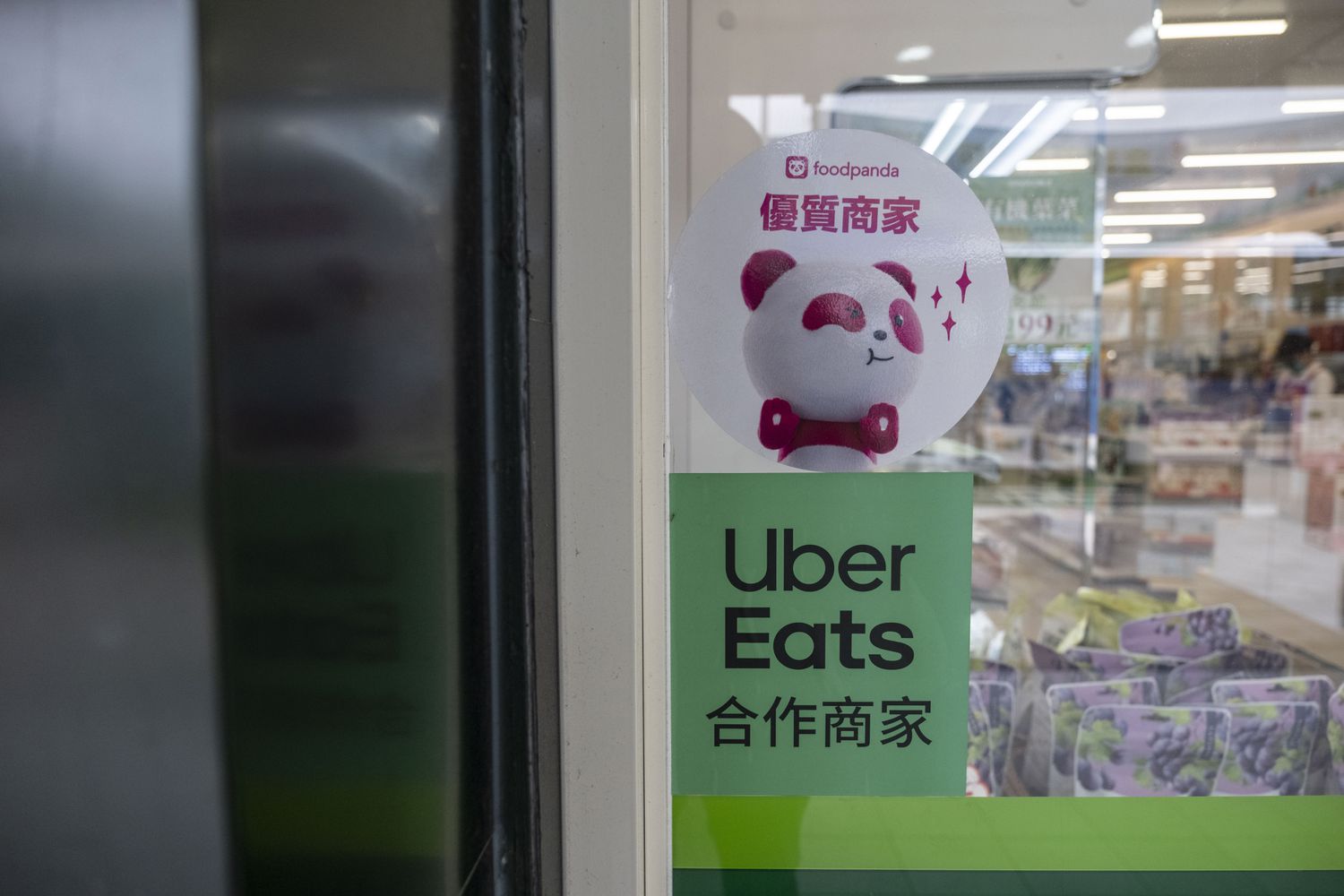Uber's Foodpanda Taiwan Acquisition Blocked By Regulators

Table of Contents
Reasons Behind the Regulatory Block
The Taiwanese Fair Trade Commission (FTC) cited several key concerns that led to the blocking of Uber's Foodpanda Taiwan acquisition. These concerns, which highlight the complexities of mergers and acquisitions in a rapidly evolving digital market, are central to understanding this significant development.
Anti-Monopoly Concerns
The primary reason for the FTC's decision centers around potential monopolistic practices. The combined market share of Foodpanda and Uber Eats in Taiwan is substantial, creating a scenario where the merger could stifle competition.
- Dominant Market Share: Foodpanda and Uber Eats already hold a significant portion of the Taiwanese food delivery market, leaving little room for smaller competitors.
- Reduced Consumer Choice: The FTC expressed serious concerns that the merger would lead to a reduction in consumer choice, potentially limiting the variety of restaurants and services available.
- Higher Prices and Reduced Innovation: A lack of competition often translates to higher prices for consumers and a decrease in innovation and service quality. The FTC aimed to prevent this outcome.
Data Privacy and Security Issues
Beyond anti-monopoly concerns, the FTC also expressed reservations about the potential impact on data privacy and security. The merging of two vast datasets held by Uber and Foodpanda raises significant concerns.
- Massive Data Consolidation: Both companies possess extensive user data, including personal information, order history, and location data. Combining these datasets creates a significant pool of sensitive information.
- Consumer Privacy Risks: The FTC's scrutiny highlights potential risks to consumer privacy if the merged entity fails to adequately protect this sensitive information.
- Compliance with Taiwanese Data Protection Laws: The acquisition was also examined through the lens of compliance with Taiwanese data protection laws and regulations.
Impact on Local Businesses
The potential impact on local businesses, particularly small restaurants and food vendors, was another key consideration for the FTC.
- Increased Commission Fees: The merger could have resulted in increased commission fees charged to restaurants, squeezing their profit margins and potentially impacting their viability.
- Reduced Competition: The loss of competition between Foodpanda and Uber Eats could limit the bargaining power of restaurants, leaving them with fewer options for delivery services.
- Disruption to the Food Delivery Ecosystem: The acquisition posed a risk of disrupting the delicate balance of the Taiwanese food delivery ecosystem, potentially harming smaller players and reducing overall diversity.
Implications of the Blocked Acquisition
The FTC's decision carries significant implications for both Uber and Foodpanda, as well as the broader Taiwanese food delivery market.
Future of Uber Eats and Foodpanda in Taiwan
With the acquisition blocked, both Uber Eats and Foodpanda must now chart independent courses.
- Uber Eats' Independent Strategy: Uber Eats will need to significantly strengthen its market position independently, potentially through aggressive marketing campaigns, enhanced features, and strategic partnerships.
- Foodpanda's Competitive Response: Foodpanda, in turn, will need to defend its market share against Uber Eats and potentially other competitors. This likely involves similar strategies focused on competitive pricing, improved services, and enhanced user experiences.
- Increased Marketing Competition: Expect both companies to significantly ramp up marketing and promotional efforts to attract and retain customers in a now more competitive marketplace.
Impact on the Taiwanese Food Delivery Market
The blocked acquisition opens up several possibilities for the Taiwanese food delivery market.
- Opportunities for Smaller Players: The decision creates opportunities for smaller, local food delivery services to gain market share by capitalizing on increased competition.
- New Market Entrants: The landscape may become more attractive for new entrants seeking to establish themselves in a less-dominated market.
- Shifting Market Dynamics: Consumer behavior and market dynamics are expected to change in response to the increased competition and the absence of a merged entity.
Regulatory Response and Future Outlook
The FTC's actions highlight its commitment to ensuring fair competition and protecting consumer interests within the Taiwanese market.
The Role of the Fair Trade Commission
The FTC played a crucial role in this decision, demonstrating its commitment to upholding fair competition and consumer protection.
- Upholding Fair Competition: The FTC's decision underscores its commitment to preventing the formation of monopolies and ensuring a level playing field for all market participants.
- Protecting Consumer Interests: The FTC acted to protect the interests of Taiwanese consumers, preventing potential price hikes and limited choices.
- Further Investigation and Repercussions: The FTC's investigation into the acquisition may continue, with potential repercussions for both Uber and Foodpanda.
Potential Appeals and Legal Challenges
Uber and Foodpanda may pursue various legal avenues to challenge the FTC's decision.
- Appealing the FTC's Decision: Both companies have the option of appealing the decision through the Taiwanese legal system.
- Potential Legal Battles: This could lead to lengthy and complex legal battles that could further delay or even alter the final outcome.
- Uncertainty Surrounding Timeline: The uncertainty surrounding the timeline and the ultimate outcome adds to the complexity of this situation.
Conclusion
The blocking of Uber's acquisition of Foodpanda Taiwan underscores the importance of considering anti-competitive practices and data privacy in major mergers and acquisitions within the tech sector. The decision has far-reaching implications for the Taiwanese food delivery market, opening doors for smaller competitors while forcing Uber Eats and Foodpanda to recalibrate their strategies. The ongoing legal uncertainty surrounding the Uber's Foodpanda Taiwan Acquisition Blocked situation demands careful monitoring. Understanding the complexities of this case is vital for anyone involved in or following the food delivery sector in Taiwan and globally. Stay informed on further developments regarding the Uber Foodpanda Taiwan acquisition for insights into the evolving market dynamics.

Featured Posts
-
 Fortnites Cowboy Bebop Skins How Much Does The Faye Valentine And Spike Spiegel Bundle Cost
May 17, 2025
Fortnites Cowboy Bebop Skins How Much Does The Faye Valentine And Spike Spiegel Bundle Cost
May 17, 2025 -
 Epic Games Sued Allegations Of Large Scale Deceptive Practices In Fortnite And Other Games
May 17, 2025
Epic Games Sued Allegations Of Large Scale Deceptive Practices In Fortnite And Other Games
May 17, 2025 -
 Knicks Success Thibodeaus Transformation And The Overcoming Of A Weakness
May 17, 2025
Knicks Success Thibodeaus Transformation And The Overcoming Of A Weakness
May 17, 2025 -
 Chinas Ambassador On Potential Formal Trade Agreement With Canada
May 17, 2025
Chinas Ambassador On Potential Formal Trade Agreement With Canada
May 17, 2025 -
 Fortnite Players Express Disappointment With New Shop Items
May 17, 2025
Fortnite Players Express Disappointment With New Shop Items
May 17, 2025
Latest Posts
-
 Tvs Jupiter Ather 450 X Hero Pleasure
May 17, 2025
Tvs Jupiter Ather 450 X Hero Pleasure
May 17, 2025 -
 Decouverte Des Trottinettes Electriques Xiaomi Scooter 5 5 Pro Et 5 Max
May 17, 2025
Decouverte Des Trottinettes Electriques Xiaomi Scooter 5 5 Pro Et 5 Max
May 17, 2025 -
 Xiaomi Lance Les Scooters 5 5 Pro Et 5 Max Quelles Sont Les Differences
May 17, 2025
Xiaomi Lance Les Scooters 5 5 Pro Et 5 Max Quelles Sont Les Differences
May 17, 2025 -
 Auckland Southern Motorway Dashcam Captures Reckless E Scooter Ride
May 17, 2025
Auckland Southern Motorway Dashcam Captures Reckless E Scooter Ride
May 17, 2025 -
 Trottinette Electrique Xiaomi Test Des Modeles Scooter 5 5 Pro Et 5 Max
May 17, 2025
Trottinette Electrique Xiaomi Test Des Modeles Scooter 5 5 Pro Et 5 Max
May 17, 2025
